高中英语情态动词的特殊用法
- 格式:doc
- 大小:21.00 KB
- 文档页数:8
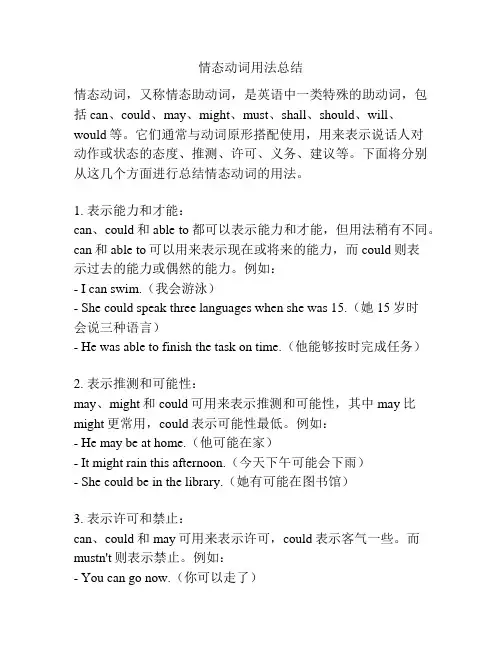
情态动词用法总结情态动词,又称情态助动词,是英语中一类特殊的助动词,包括can、could、may、might、must、shall、should、will、would等。
它们通常与动词原形搭配使用,用来表示说话人对动作或状态的态度、推测、许可、义务、建议等。
下面将分别从这几个方面进行总结情态动词的用法。
1. 表示能力和才能:can、could和able to都可以表示能力和才能,但用法稍有不同。
can和able to可以用来表示现在或将来的能力,而could则表示过去的能力或偶然的能力。
例如:- I can swim.(我会游泳)- She could speak three languages when she was 15.(她15岁时会说三种语言)- He was able to finish the task on time.(他能够按时完成任务)2. 表示推测和可能性:may、might和could可用来表示推测和可能性,其中may比might更常用,could表示可能性最低。
例如:- He may be at home.(他可能在家)- It might rain this afternoon.(今天下午可能会下雨)- She could be in the library.(她有可能在图书馆)3. 表示许可和禁止:can、could和may可用来表示许可,could表示客气一些。
而mustn't则表示禁止。
例如:- You can go now.(你可以走了)- Could I use your computer?(我能用一下你的电脑吗?)- You mustn't smoke here.(你不能在这里抽烟)4. 表示义务和必要性:must表示主观上的义务和必要性,常用来表示说话人的主观判断。
have to则表示客观上的必要性和强制性。
例如:- I must finish my homework tonight.(我必须今晚完成作业)- I have to get up early tomorrow.(我明天必须早起)5. 表示建议和推荐:should和ought to都表示建议或推荐,should更常用一些,ought to用得相对较少。
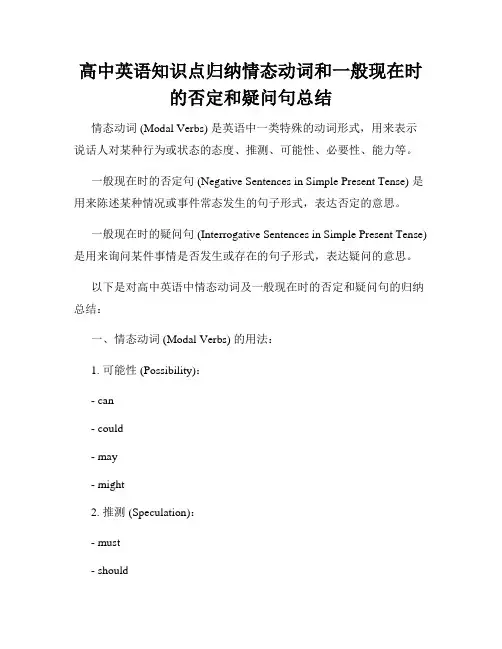
高中英语知识点归纳情态动词和一般现在时的否定和疑问句总结情态动词 (Modal Verbs) 是英语中一类特殊的动词形式,用来表示说话人对某种行为或状态的态度、推测、可能性、必要性、能力等。
一般现在时的否定句 (Negative Sentences in Simple Present Tense) 是用来陈述某种情况或事件常态发生的句子形式,表达否定的意思。
一般现在时的疑问句 (Interrogative Sentences in Simple Present Tense) 是用来询问某件事情是否发生或存在的句子形式,表达疑问的意思。
以下是对高中英语中情态动词及一般现在时的否定和疑问句的归纳总结:一、情态动词 (Modal Verbs) 的用法:1. 可能性 (Possibility):- can- could- may- might2. 推测 (Speculation):- must- should- may/might3. 必要性 (Necessity):- must- have to- need to- should4. 动词表示能力 (Ability):- can- could- be able to5. 动词表示许可 (Permission):- can- could- may- might6. 动词表示请求 (Request):- can- could- will7. 动词表示允诺 (Promise):- will- shall- would8. 动词表示建议 (Advice):- should- ought to- had better二、一般现在时的否定句 (Negative Sentences in Simple Present Tense):1. 在一般现在时的肯定句中,在动词前加上助动词 "do" 或 "does",并加上 "not" 以构成否定句。
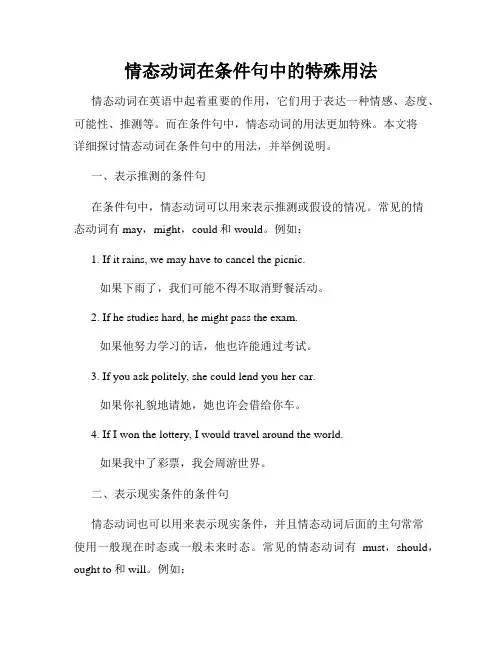
情态动词在条件句中的特殊用法情态动词在英语中起着重要的作用,它们用于表达一种情感、态度、可能性、推测等。
而在条件句中,情态动词的用法更加特殊。
本文将详细探讨情态动词在条件句中的用法,并举例说明。
一、表示推测的条件句在条件句中,情态动词可以用来表示推测或假设的情况。
常见的情态动词有may,might,could和would。
例如:1. If it rains, we may have to cancel the picnic.如果下雨了,我们可能不得不取消野餐活动。
2. If he studies hard, he might pass the exam.如果他努力学习的话,他也许能通过考试。
3. If you ask politely, she could lend you her car.如果你礼貌地请她,她也许会借给你车。
4. If I won the lottery, I would travel around the world.如果我中了彩票,我会周游世界。
二、表示现实条件的条件句情态动词也可以用来表示现实条件,并且情态动词后面的主句常常使用一般现在时态或一般未来时态。
常见的情态动词有must,should,ought to和will。
例如:1. If you want to succeed, you must work hard.如果你想成功,你必须努力工作。
2. If you need any help, you should ask for it.如果你需要帮助,你应该寻求。
3. If you want to be healthy, you ought to eat more vegetables.如果你想要健康,你应该多吃蔬菜。
4. If you come early, we will have plenty of time to chat.如果你早点来,我们会有充足的时间聊天。
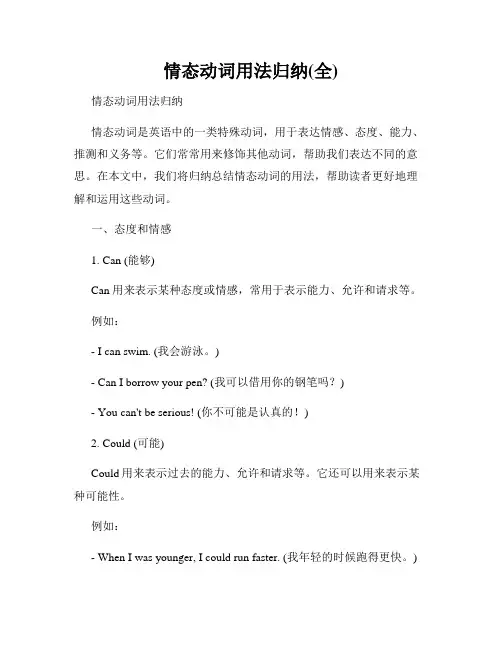
情态动词用法归纳(全)情态动词用法归纳情态动词是英语中的一类特殊动词,用于表达情感、态度、能力、推测和义务等。
它们常常用来修饰其他动词,帮助我们表达不同的意思。
在本文中,我们将归纳总结情态动词的用法,帮助读者更好地理解和运用这些动词。
一、态度和情感1. Can (能够)Can用来表示某种态度或情感,常用于表示能力、允许和请求等。
例如:- I can swim. (我会游泳。
)- Can I borrow your pen? (我可以借用你的钢笔吗?)- You can't be serious! (你不可能是认真的!)2. Could (可能)Could用来表示过去的能力、允许和请求等。
它还可以用来表示某种可能性。
例如:- When I was younger, I could run faster. (我年轻的时候跑得更快。
)- Could I ask you a question? (我可以问你一个问题吗?)- It could rain later, so bring an umbrella. (今天后面可能会下雨,所以带上雨伞。
)3. May (可能)May常表示许可、请求和推测等。
它还可以用来表示某种可能性或希望。
例如:- May I use your phone? (我可以用一下你的手机吗?)- It may rain tomorrow. (明天可能会下雨。
)- They may arrive late. (他们可能会迟到。
)4. Might (可能)Might与may的用法类似,但表示的可能性稍微低一些。
例如:- She might be busy. (她可能很忙。
)- I might go to the party, but I'm not sure yet. (我可能会去参加派对,但我还不确定。
)二、能力和推测1. Must (必须)Must用来表示强烈的推断或必要性。
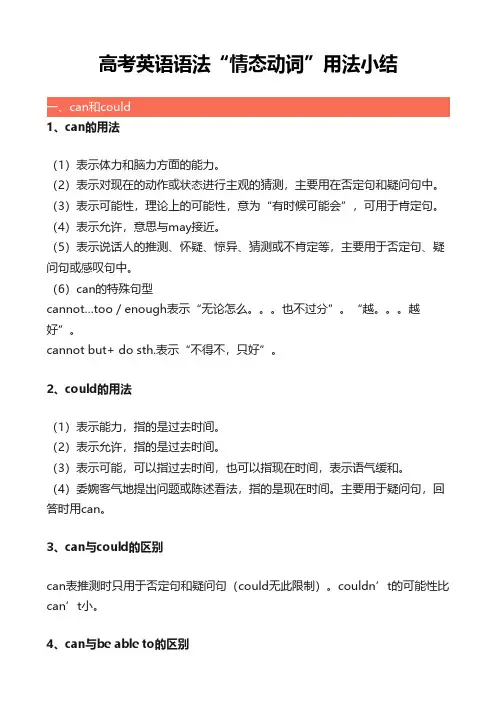
高考英语语法“情态动词”用法小结1、can的用法(1)表示体力和脑力方面的能力。
(2)表示对现在的动作或状态进行主观的猜测,主要用在否定句和疑问句中。
(3)表示可能性,理论上的可能性,意为“有时候可能会”,可用于肯定句。
(4)表示允许,意思与may接近。
(5)表示说话人的推测、怀疑、惊异、猜测或不肯定等,主要用于否定句、疑问句或感叹句中。
(6)can的特殊句型cannot…too / enough表示“无论怎么。
也不过分”。
“越。
越好”。
cannot but+ do sth.表示“不得不,只好”。
2、could的用法(1)表示能力,指的是过去时间。
(2)表示允许,指的是过去时间。
(3)表示可能,可以指过去时间,也可以指现在时间,表示语气缓和。
(4)委婉客气地提出问题或陈述看法,指的是现在时间。
主要用于疑问句,回答时用can。
3、can与could的区别can表推测时只用于否定句和疑问句(could无此限制)。
couldn’t的可能性比can’t小。
4、can与be able to的区别(1)现在时:无区别,但后者不常用。
(2)完成时;can没有完成时,此时要用have(has,had)been able to。
(3)将来时:can没有将来时,要用will be able to。
(4)过去时:could表示一般能力,was/were able to 表示在具体场合通过努力成功做成某事的能力。
1、may的用法(1)表示询问或说明一件事可不可以做。
(2)表示一件事或许会发生或某种情况可能会存在,通常用在肯定句和否定句中。
注意:表示可能性时,can’t语气强,表示“不可能”,may not语气弱,表示“可能不”。
2、might的用法(1)表示询问或允许,指的是过去时间。
(2)表示可能发生的事,可以指过去时间,也可以指现在时间,语气更加不肯定,可能性比may小一些。
3、may与might的特殊用法(1)“may+主语+动词原形”表示祝愿。
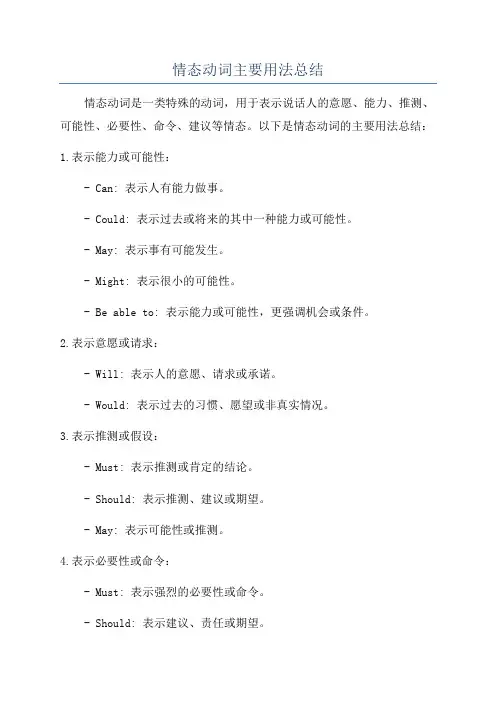
情态动词主要用法总结
情态动词是一类特殊的动词,用于表示说话人的意愿、能力、推测、可能性、必要性、命令、建议等情态。
以下是情态动词的主要用法总结:1.表示能力或可能性:
- Can: 表示人有能力做事。
- Could: 表示过去或将来的其中一种能力或可能性。
- May: 表示事有可能发生。
- Might: 表示很小的可能性。
- Be able to: 表示能力或可能性,更强调机会或条件。
2.表示意愿或请求:
- Will: 表示人的意愿、请求或承诺。
- Would: 表示过去的习惯、愿望或非真实情况。
3.表示推测或假设:
- Must: 表示推测或肯定的结论。
- Should: 表示推测、建议或期望。
- May: 表示可能性或推测。
4.表示必要性或命令:
- Must: 表示强烈的必要性或命令。
- Should: 表示建议、责任或期望。
- Have to: 表示客观上的必要性。
5.表示允许或禁止:
- Can: 表示人被允许做事。
- May: 表示人有许可或请求。
- Must not: 表示禁止做事。
6.表示习惯、忠告或规定:
- Should: 表示习惯、忠告或规定。
- Ought to: 表示强烈的建议或道义上的责任。
情态动词的用法具有一定的灵活性,其意义和用法还会受上下文的影响。
特别是在否定和疑问句中,情态动词的用法和意义可能会有所变化。
因此,对于情态动词的深入理解需要通过大量的阅读和实践来逐渐掌握。
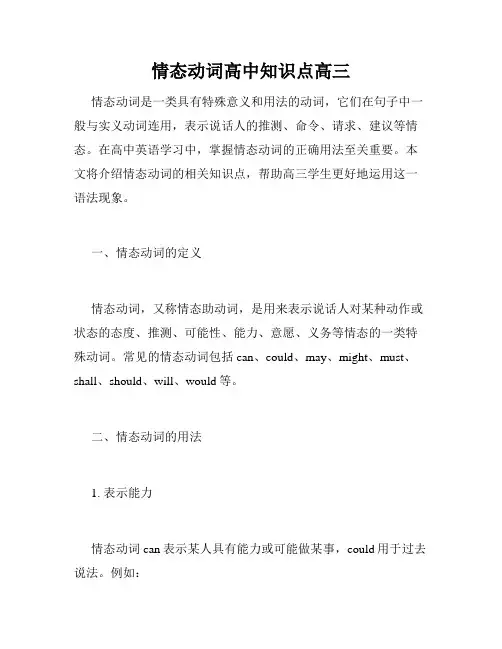
情态动词高中知识点高三情态动词是一类具有特殊意义和用法的动词,它们在句子中一般与实义动词连用,表示说话人的推测、命令、请求、建议等情态。
在高中英语学习中,掌握情态动词的正确用法至关重要。
本文将介绍情态动词的相关知识点,帮助高三学生更好地运用这一语法现象。
一、情态动词的定义情态动词,又称情态助动词,是用来表示说话人对某种动作或状态的态度、推测、可能性、能力、意愿、义务等情态的一类特殊动词。
常见的情态动词包括can、could、may、might、must、shall、should、will、would等。
二、情态动词的用法1. 表示能力情态动词can表示某人具有能力或可能做某事,could用于过去说法。
例如:- She can speak three languages fluently.(她能说流利的三种语言)- He could lift the heavy boxes when he was younger.(他年轻时能搬起这些沉重的箱子)2. 表示推测和可能性情态动词may、might、could用于表示推测和可能性。
may用于表示较为肯定的推测,might和could表示推测的可能性较小。
例如:- The weather is cloudy, it may rain later.(天气多云,可能会下雨)- He might be late for the meeting.(他可能会迟到会议)3. 表示义务和建议情态动词must表示说话人对某种行为具有强烈的责任感或坚决要求,should表示建议。
例如:- We must obey the laws of the country.(我们必须遵守国家的法律)- You should apologize to your friend for your mistake.(你应该为你的错误向朋友道歉)4. 表示许可和请求情态动词can、may、could用于表示允许和请求。
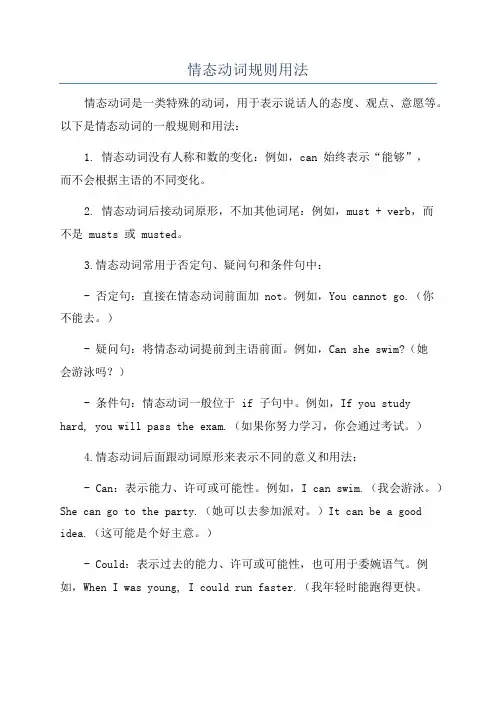
情态动词规则用法情态动词是一类特殊的动词,用于表示说话人的态度、观点、意愿等。
以下是情态动词的一般规则和用法:1. 情态动词没有人称和数的变化:例如,can 始终表示“能够”,而不会根据主语的不同变化。
2. 情态动词后接动词原形,不加其他词尾:例如,must + verb,而不是 musts 或 musted。
3.情态动词常用于否定句、疑问句和条件句中:- 否定句:直接在情态动词前面加 not。
例如,You cannot go.(你不能去。
)- 疑问句:将情态动词提前到主语前面。
例如,Can she swim?(她会游泳吗?)- 条件句:情态动词一般位于 if 子句中。
例如,If you study hard, you will pass the exam.(如果你努力学习,你会通过考试。
)4.情态动词后面跟动词原形来表示不同的意义和用法:- Can:表示能力、许可或可能性。
例如,I can swim.(我会游泳。
)She can go to the party.(她可以去参加派对。
)It can be a good idea.(这可能是个好主意。
)- Could:表示过去的能力、许可或可能性,也可用于委婉语气。
例如,When I was young, I could run faster.(我年轻时能跑得更快。
- May:表示允许、请求或可能性。
例如,You may leave the room.(你可以离开这个房间。
)May I borrow your pen?(我可以借用你的笔吗?)It may rain later.(可能会下雨。
)- Must:表示必须、推测或强调。
例如,You must finish your homework before you go out.(你必须在外出前完成作业。
)She must be tired.(她一定很累。
)I must go now.(我必须现在走。
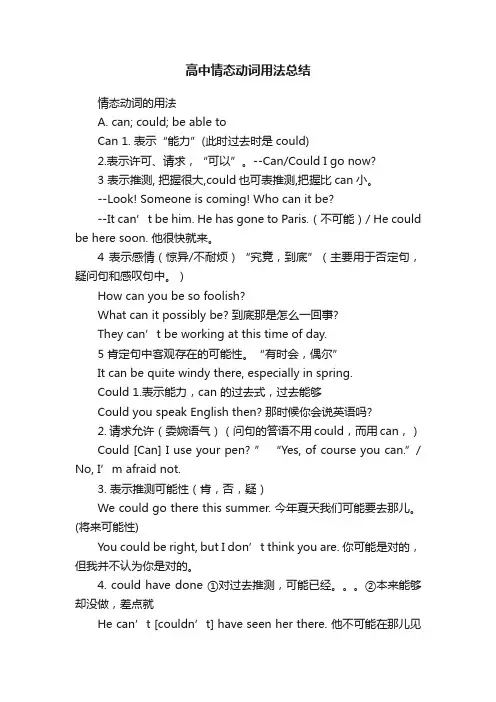
高中情态动词用法总结情态动词的用法A. can; could; be able toCan 1. 表示“能力”(此时过去时是could)2.表示许可、请求,“可以”。
--Can/Could I go now?3 表示推测, 把握很大,could也可表推测,把握比can小。
--Look! Someone is coming! Who can it be?--It can’t be him. He has gone to Paris.(不可能)/ He could be here soon. 他很快就来。
4 表示感情(惊异/不耐烦)“究竟,到底”(主要用于否定句,疑问句和感叹句中。
)How can you be so foolish?What can it possibly be? 到底那是怎么一回事?They can’t be working at this time of day.5 肯定句中客观存在的可能性。
“有时会,偶尔”It can be quite windy there, especially in spring.Could 1.表示能力,can 的过去式,过去能够Could you speak English then? 那时候你会说英语吗?2. 请求允许(委婉语气)(问句的答语不用could,而用can,)Could [Can] I use your pen? ” “Yes, of course you can.”/ No, I’m afraid not.3. 表示推测可能性(肯,否,疑)We could go there this summer. 今年夏天我们可能要去那儿。
(将来可能性)You could be right, but I don’t think you are. 你可能是对的,但我并不认为你是对的。
4. could have done ①对过去推测,可能已经。
②本来能够却没做,差点就He can’t [couldn’t] have seen her there. 他不可能在那儿见到她。
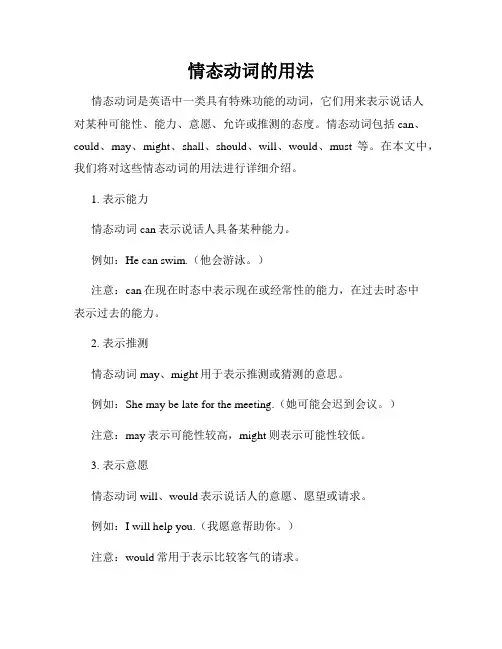
情态动词的用法情态动词是英语中一类具有特殊功能的动词,它们用来表示说话人对某种可能性、能力、意愿、允许或推测的态度。
情态动词包括can、could、may、might、shall、should、will、would、must等。
在本文中,我们将对这些情态动词的用法进行详细介绍。
1. 表示能力情态动词can表示说话人具备某种能力。
例如:He can swim.(他会游泳。
)注意:can在现在时态中表示现在或经常性的能力,在过去时态中表示过去的能力。
2. 表示推测情态动词may、might用于表示推测或猜测的意思。
例如:She may be late for the meeting.(她可能会迟到会议。
)注意:may表示可能性较高,might则表示可能性较低。
3. 表示意愿情态动词will、would表示说话人的意愿、愿望或请求。
例如:I will help you.(我愿意帮助你。
)注意:would常用于表示比较客气的请求。
4. 表示推测的过去情态动词must常用于表示对过去情况的推测或肯定。
例如:He must have missed the bus.(他肯定错过了公交车。
)注意:must用于表示对过去情况的肯定,而might用于表示对过去情况的推测。
5. 表示义务或必要性情态动词must表示对义务、必要性或确定性的肯定。
例如:You must finish your homework.(你必须完成作业。
)6. 表示建议或应该情态动词should表示建议或应该。
例如:You should go to bed early.(你应该早点睡觉。
)注意:should还可以表示对过去情况的推测,例如:He should have arrived by now.(他现在应该已经到达了。
)7. 表示允许或许可情态动词can与may可以用于表示许可或允许。
例如:Can I borrow your pen?(我可以借你的钢笔吗?)8. 表示可能性情态动词could用于表示可能性。
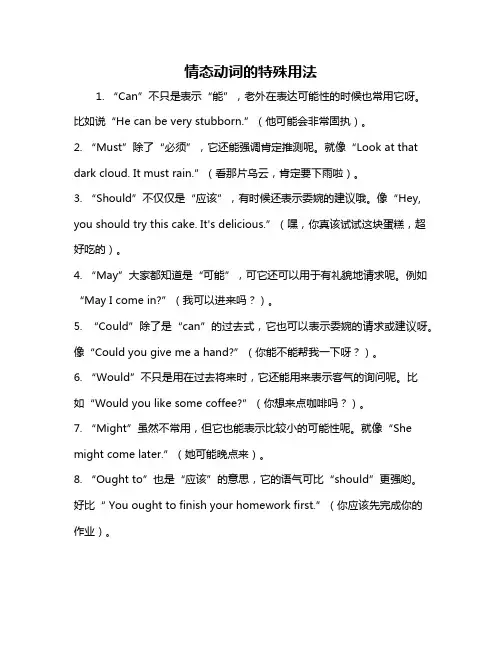
情态动词的特殊用法1. “Can”不只是表示“能”,老外在表达可能性的时候也常用它呀。
比如说“He can be very stubborn.”(他可能会非常固执)。
2. “Must”除了“必须”,它还能强调肯定推测呢。
就像“Look at that dark cloud. It must rain.”(看那片乌云,肯定要下雨啦)。
3. “Should”不仅仅是“应该”,有时候还表示委婉的建议哦。
像“Hey, you should try this cake. It's delicious.”(嘿,你真该试试这块蛋糕,超好吃的)。
4. “May”大家都知道是“可能”,可它还可以用于有礼貌地请求呢。
例如“May I come in?”(我可以进来吗?)。
5. “Could”除了是“can”的过去式,它也可以表示委婉的请求或建议呀。
像“Could you give me a hand?”(你能不能帮我一下呀?)。
6. “Would”不只是用在过去将来时,它还能用来表示客气的询问呢。
比如“Would you like some coffee?”(你想来点咖啡吗?)。
7. “Might”虽然不常用,但它也能表示比较小的可能性呢。
就像“She might come later.”(她可能晚点来)。
8. “Ought to”也是“应该”的意思,它的语气可比“should”更强哟。
好比“ You ought to finish your homework first.”(你应该先完成你的作业)。
9. “Need”当情态动词的时候是不是很特别?像“ You needn't do that.”(你不必那样做)。
情态动词的这些特殊用法是不是很有趣呀?它们能让我们的表达更加丰富多样,也更能准确传达我们的意思呢!。
情态动词的意义和用法情态动词是一类特殊的动词形式,它们用来表示说话人对某种行为、能力、可能性等方面的态度、观点或建议。
情态动词包括can、could、may、might、must、shall、should、will、would等。
本文将介绍情态动词的意义和用法。
一、情态动词的意义1. Can:表示能力、许可或允许。
- 表示能力:I can swim.(我会游泳。
)- 表示许可:Can I use your phone?(我能用一下你的手机吗?)2. Could:表示过去的能力、曾经的可能性或礼貌的请求。
- 表示过去的能力:When I was young, I could run very fast.(我年轻的时候跑得很快。
)- 表示曾经的可能性:He could be at home.(他可能在家里。
)- 表示礼貌的请求:Could you please pass me the salt?(请你把盐递给我好吗?)3. May:表示许可、可能性或推测。
- 表示许可:May I go to the bathroom?(我可以去洗手间吗?)- 表示可能性:It may rain tomorrow.(明天可能会下雨。
)- 表示推测:He may be busy right now.(他现在可能很忙。
)4. Might:表示可能性或推测(比may的可能性更小)。
- 表示可能性:She might come to the party tonight.(她可能会来参加今晚的派对。
)- 表示推测:They might be lost.(他们可能迷路了。
)5. Must:表示必须或肯定性的推测。
- 表示必须:You must finish your homework before going out.(你必须在出门前完成作业。
)- 表示肯定性的推测:He must be tired after working all day.(他整天工作一定很累。
位敦市安定阳光实验学校中学高三英语专项复习情态动词特殊用法大集合情态动词除了基本的用法以外还有许多特殊之处,最基本的用法读者可以结合自己的语法书籍来适当复习,这儿就不赘述,主要略列一些特殊用法,对各位英语爱好者有所帮助。
1.can和could⑴Can 和 could 可以表示某人或某物一时的特点,可以翻译为“有可能,有时会”。
It can be very warm in this area 。
这个有时可能非常暖和.He can be very friendly at times 。
他有时会非常。
⑵can表示能力时(即有某种知识和技能而能办到),可以与be able to 换用。
但是在将来时和完成时中必须用be able to ;表示经过努力而地办到了某个具体的事情时,只能用be able to ,不可以用can。
这种用法的be able to 相当于succeed in 或manage to。
另外:can not 比cannot 更强调。
Can you type ?= Are you able to type ?I am sure we shall be able to get you a jop soon 。
(不能用can)He has been able to finish the work on time 。
(不可用can)After years of hard work he was able to win the prize 。
(不可以用could)He could't climb the mountain 。
(没有能力爬,因而也没有爬)He was not able to climb the mountain 。
(尝试爬过,但是没能爬上去)另外:①be able to 强调能力,通常表示一次性的事件,一般不表示经常性的事件。
I was able to pass the examination 。
情态动词的用法及其不同语境下的表达情态动词(Modal Verbs)是英语中一类特殊的动词形式,用来表达说话人的态度、意愿、推测或能力等。
本文将重点介绍情态动词的用法,并探讨在不同语境下的表达方式。
一、情态动词的基本用法情态动词包括can、could、may、might、shall、should、will、would、must等。
它们有以下几个基本用法:1. 表示能力与许可:- Can表示一种能力或技能,用于肯定句,如:He can swim.(他会游泳。
)- Could表示过去的能力或技能,用于肯定句,如:I could solve the problem yesterday.(昨天我能够解决这个问题。
)- May表示许可或可能性,用于肯定句,如:You may borrow my book.(你可以借我的书。
)- Might表示较低的可能性,用于肯定句,如:He might come to the party tonight.(他今晚可能会来参加派对。
)2. 表示建议与义务:- Should表示应该或建议,用于肯定句,如:You should study hard for the upcoming exam.(你应该为即将来临的考试努力学习。
)- Shall通常用于提出建议或提议,用于疑问句或者以第一人称作主语的肯定句,如:Shall we go to the cinema?(我们去看电影好吗?)3. 表示推测与可能性:- Must表示很有可能,用于肯定句,如:She must be tired after working all day.(整天工作后,她一定很累。
)- May和might表示可能性,用于肯定句,如:It may rain tomorrow.(明天可能会下雨。
)4. 表示意愿与请求:- Will表示意愿,用于表达决心、意志,如:I will definitely complete the project on time.(我一定会按时完成项目。
高考英语情态动词用法及解题技巧高考英语情态动词用法及解题技巧导语:情态动词是中学英语语法的重点,也是高考的热点。
只用作情态动词的有:can/could,may/might,must,ought to,be able to;既可作情态动词又可作实义动词的有:need,dare;既可作情态动词又为助动词的有:shall/should/w1ll/would。
以下是小编为大家精心整理的高考英语情态动词用法及解题技巧,欢迎大家阅读参考!1情态动词need的用法1. need作情态动词,一般用于疑问句和否定句中,表示“需要”、“必要”。
当其用于现在时和将来时时,在宾语从句中可当过去时用。
肯定回答用must(或have to, ought to, should) 来表达。
否定式为need not / needn't表示“不必,不需要”。
如:(1) You needn't show your passport at the entrance unless the guard asks you for it.(2) —Shall I tell Jack about it?—No, you needn't. I've told him already.2. need作实义动词,意为“需要”、“要求”。
如:(1) You don't need to leave so early.(2) He needs to try one more experiment.2情态动词dare的用法1. 情态动词,表示“敢”,后接动词原形,用于否定句、疑问句和条件状语从句中。
如:(1) We dare not refuse their request.(2) Dare you walk through the forest at night?2. 当实义动词用时,可用于各种句型中。
dare作实义动词用在否定句和疑问句中时,其后接不定式有时可省去“to”。
情态动词在高考中的用法
情态动词是指表示说话人的语气、态度或情绪的动词,它们不能单独作谓语,必须和其他动词一起构成谓语。
在高考中,情态动词的用法是一个重要的考点,以下是情态动词的常见用法:
1. 表示能力:can, could, be able to
- can 表示现在的能力;could 表示过去的能力;be able to 表示通过努力能够做到。
2. 表示许可或请求:can, could, may, might
- can 和 could 表示许可或请求时,常用于口语中;may 和might 表示许可或请求时,语气比较正式。
3. 表示可能性:may, might, can, could
- may 和 might 表示可能性时,语气比较弱;can 和 could 表示可能性时,语气比较强。
4. 表示推测:must, can't, could, might
- must 表示肯定的推测,语气最强;can't 表示否定的推测,语气也很强;could 和 might 表示推测时,语气较弱。
5. 表示义务或责任:must, should, ought to
- must 表示必须做某事,语气最强;should 和 ought to 表示应该做某事,语气较弱。
6. 表示虚拟语气:would, could, might
- would, could, might 用于虚拟语气中,表示与现在事实相反或与过去事实相反的情况。
在高考中,情态动词的用法需要根据具体的语境来判断,因此需要考生具备较强的语言理解能力和运用能力。
同时,考生还需要注意情态动词的时态和语态等方面的变化,以确保答案的准确性。
情态动词的意义和用法情态动词是英语中一类特殊的动词,用于表示一种态度、意愿、能力、推测或建议等。
情态动词通常和其他动词一起使用,用来表达说话者的态度或观点。
本文将详细介绍情态动词的意义和用法。
一、情态动词的意义情态动词具有特殊的意义,常常用来表达以下几种情态:1. 可能性:can, could, may, might, must这些情态动词用来表示某事或某种情况的可能性。
例如:- She can speak Chinese fluently.(她可以流利地说中文。
)- It may rain tomorrow.(明天可能会下雨。
)- He must be busy.(他一定很忙。
)2. 必要性或建议:must, should, ought to这些情态动词用来表示某事的必要性、强烈建议或期望。
例如:- You must finish your homework before going out to play.(你必须在外出玩之前完成作业。
)- We should recycle to protect the environment.(我们应该回收以保护环境。
)- You ought to apologize to her for your mistake.(你应该为你的错误向她道歉。
)3. 假设或推测:may, might, could这些情态动词用来表示某种假设、推测或猜测。
例如:- She may be late for the meeting.(她可能会迟到会议。
)- It might rain later.(或许晚些时候会下雨。
)- He could be the one who stole my wallet.(他可能是偷了我的钱包的那个人。
)4. 能力或技能:can, could, be able to这些情态动词用来表示某人的能力或技能。
例如:- I can swim.(我会游泳。
新课标高中英语情态动词的特殊用法情态动词的特殊用法是历年高考的考查热点。
下面我们以实例进行解析,帮助同学们更好地掌握该内容。
1. _____ fired, your health care and other benefits will not be immediately cut off.A. Would you beB. Should you beC. Could you beD. Might you be解析:答案为B。
Should you be fired = If you should be fired。
英语中should是一个常用的情态动词,但它可用于条件状语从句中,表示语气较强的假设,意为“万一,竟然”。
2. —What’s the name?—Khulaifi. _____ I spell that for you?A. ShallB. WouldC. CanD. Might解析:答案为A。
Shall I/we . . . ? 是用来表示征求对方意见或建议的常用句型,它不表示将来。
注意:shall的这一用法也适用于第三人称的疑问句中。
例如:Shall he come to see you?(要不要他来看你?)3. John, look at the time. _____ you play the piano at such a late hour?A. MustB. CanC. MayD. Need解析:答案为A。
此题考查must的特殊用法。
这里must表示与说话人相反的愿望或语气不耐烦,意为“偏偏,偏要”。
注意:近几年must表示“偏偏,偏要”这一用法已成为高考的一个热点。
4. —Must I turn off the gas after cooking?—Of course. You can never be _____ careful with that.A. enoughB. tooC. soD. very解析:答案为B。
can/could not(never). . . too是一个固定搭配,意为“无论……也不过分,越……越好”。
5. Some aspects of a pilot’s job _____ be boring, and pilots often_____ work at inconvenient hours.A. can;have toB. may;canC. have to;mayD. ought to;must解析:答案为A。
考查can表示一时的可能性、偶尔发生的事情,意为“有时会”。
这个考点在近几年高考中备受青睐。
第二空表示“不得不”。
6. —When can I come for the photos? I need them tomorrow afternoon.—They _____ be ready by 12:00.A. canB. shouldC. mightD. need解析:答案为B。
should可用于肯定句中,表示说话人较为婉转的推测,并留有余地,具有“可能;该”之意。
7. When he was there, he _____ go to that coffee shop at the corner after work every day.A. wouldB. shouldC. had betterD. might解析:答案为A。
would此处表示过去反复发生的动作或行为,意为“总是,习惯于”。
8. —Excuse me, but I want to use your computer to type a report. —You _____ have my computer if you don’t take care of it.A. shan’tB. might notC. needn’tD. shouldn’t解析:答案为A。
在表达“许诺、警告、意图、命令、决心”等,且主语为第二、第三人称时,须用情态动词shall。
9. You can’t imagine that a well-behaved gentleman _____ be so rude to a lady.A. mightB. needC. shouldD. would解析:答案为C。
should可用在表示惊奇、怀疑、不满等语气的名词性从句中,意为“竟然、竟会”。
这一点也是近年高考的热点。
10. Many people agree that _____ knowledge of English is a must in _____ international trade today.A. a;不填B. the;anC. the;theD.不填;the解析:答案为A。
句中的must为名词,意为“必需的物品、不可缺少的东西”。
如果同学们对must作名词的用法掌握较好,则非常有助于对该题的理解与解答。
11. How _____ you say that you really understand the whole story if you have covered only part of the article?A. canB. mustC. needD. may解析:答案为A。
can可用在疑问句、否定句中,表示说话者对那人所说的“只看了文章的一部分,就知道整个故事”感到怀疑和惊讶。
12. The fire spread through the hotel quickly but everyone _____ get out.A. had toB. wouldC. was able toD. could解析:答案为C。
was/were able to表示经过努力而成功地做成某事,相当于managed to do/succeeded in doing;而could只表示过去具备某种能力。
13. There’s no light on — they ____ be at home.A. can’tB. mustn’tC. needn’tD. shouldn’t解析:答案为A。
该题考查情态动词表推测。
情态动词表推测时,must用于肯定句,can用于否定和疑问句。
14. Tom, you _____ leave all your clothes on the floor like this!A. wouldn’tB. mustn’tC. needn’tD. may not解析:答案为B。
此处mustn’t表示强烈的否定,意为“千万别,一定不要”。
15. _____ we never forget each other.A. MayB. CanC. MustD. Should解析:答案为A。
此处may用于祈使句中,表示祝愿。
整句意为“愿我们彼此永不相忘。
”又如:May you return in safety. (愿你平安归来。
)练习:1. Mr. Bush is on time for everything. How _____ it be that he was late for opening ceremony?A. canB. shouldC. mayD. must2. Naturally, after I told her what to do, my daughter _____ go and do the opposite!A. mayB. canC. mustD. should3. It has been announced that candidates _______ remain in their seats until all the papers have been collected.A. canB. willC. mayD. shall4. “The interest ___________ be divided into five parts, according to the agreement made by both sides,” declared the judge.A. mayB. shouldC. mustD. shall5. You can’t imagine that a top student ______ have failed in the college entrance examination.A. mightB. needC. shouldD. would6. Football, as is known to the world, _______ be exciting and inviting.A. shouldB. mightC. canD. will7. —_____ he open the door?—Yes, please.A. ShallB. WillC. CanD. Would8. The World Wide Web is sometimes jokingly called the World Wide Wait because it _____ be very slow.A. shouldB. mustC. willD. can9. —Isn’t that Ann’s husband over there?—No, it ______ be him-I’m sure he doesn’t wear glasses.A. can’tB. must notC. won’tD. may not10. It’s nearly seven o’clock. Jack _____ be here at any moment.A. mustB. needC. shouldD. can11. What should we do if it _____ tomorrow?A. should snowB. would snowC. snowD. will snow12. You _____ use my bike on condition that you give it to me before I leave here.A. shouldB. mustC. ought toD. shall(Keys: 1. A 2. C 3. D 4. D 5. C 6. C 7. A 8. D 9. A 10.C 11. A 12. D)。